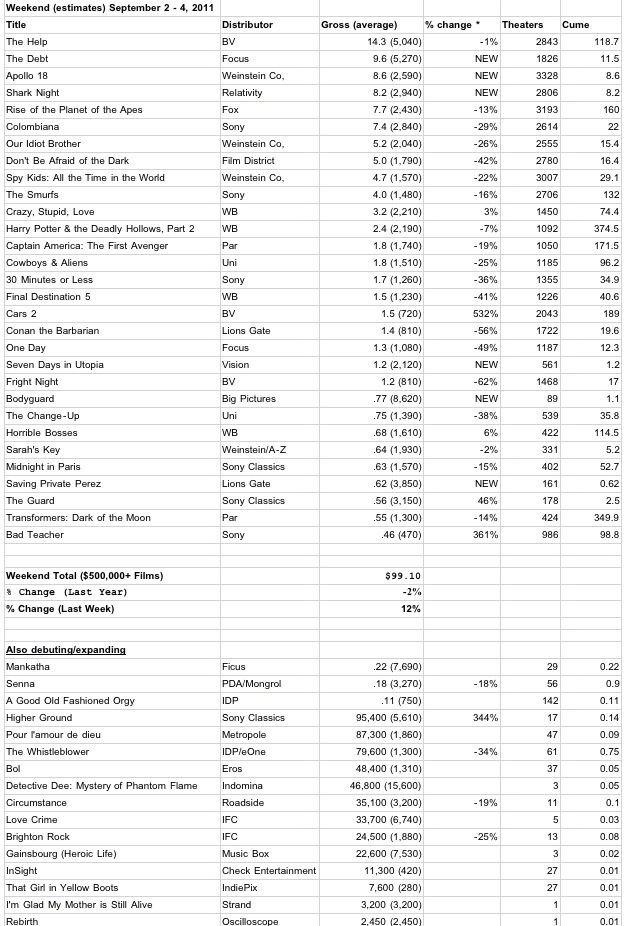By Leonard Klady Klady@moviecitynews.com
3-Day Labor Day Estimates
A Last Gasp of Summer
Preliminary numbers give summer season 2011 a slight 5% box office boost from the prior year with an estimated $4.18 billion tally. That translates into about a 2% dip in admissions with Warner Bros. getting the season box office crown with more than $1 billion in revenues. An estimated chart will be available Monday with a final chart later in the week.
The last long weekend of summer once again saw The Help at the top of the list with an estimated $14.3 million (all figures reflect 3-day estimates). The frame’s three new national releases followed with the thriller The Debt displaying better than blah results of $9.6 million ($11.5 million since its Wednesday launch). Apollo 18, a sort of Blair Witch on the Moon, grossed $8.6 million and the biting Shark Night trailed with $8.2 million.
The session also saw a burst of other new releases anxious to sell a few tickets prior to Labor Day. The inspirational Seven Days in Utopia garnered $1.2 million at 561 pews while Mexican thriller Saving Private Perez saluted with $620,000 at 161 venues.
India provided two potent bows with the Hindi Bodyguard grossing $767,000 at 89 theaters ($1.1 million since its Wednesday bow) and Tamil-language Mankatha stirring up $223,000 at 29 sites. Also noteworthy was the $46,800 total for Chinese import Detective Dee: Mystery of the Phantom Flame from three engagements. Otherwise new entries were dull or worse including a poor showing for Pour l’amour de dieu in Quebec where local productions have been experiencing a generally torrid summer response.
Business overall experienced a 12% boost from last weekend when Irene’s wind and rain took its viewing toll. Last year the leader board was fronted by debuts of The American and Machete that had respective long weekend grosses of $16.7 million and $14.1 million.
Tracking for the incoming product was generally off the mark. The Debt was predicted to arrive with an extremely dull $5 million to $7 million. With exit polls showing an audience composed 76% of viewers aged 35 years and older there’s the implication that an older crowd is as difficult to pin down as pre-teens when it comes to their viewing choices.
Conversely both Apollo 18 and Shark Night were expected to perform significantly better than actuals would indicate. Both films skewed toward 25s and younger and the latter capitalized on their receptivity to 3D gimmickry.
Adults were once again out in force for the likes of The Guard, Senna, Higher Ground and Sarah’s Key.














